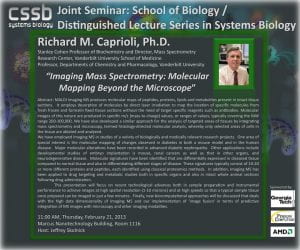 Distinguished Lecture Series Guest Speaker: Richard Caprioli
Distinguished Lecture Series Guest Speaker: Richard Caprioli
Professor of Biochemistry, Chemistry and Pharmacology; Director, Mass Spectrometry Center; and Stanford Moore Chair in Biochemistry
Vanderbilt University School of Medicine
Date & Time: Tuesday, April 30, 2013, 11:00AM
Location: Marcus 1116
Host: Jeffrey Skolnick
Abstract: MALDI Imaging MS produces molecular maps of peptides, proteins, lipids and metabolites present in intact tissue sections. It employs desorption of molecules by direct laser irradiation to map the location of specific molecules from fresh frozen and formalin fixed tissue sections without the need of target specific reagents such as antibodies. Molecular images of this nature are produced in specific m/z (mass-to-charge) values, or ranges of values, typically covering the MW range 200-100,000. We have also developed a similar approach for the analysis of targeted areas of tissues by integrating mass spectrometry and microscopy, termed histology-directed molecular analysis, whereby only selected areas of cells in the tissue are ablated and analyzed. We have employed Imaging MS in studies of a variety of biologically and medically relevant research projects. One area of special interest is the molecular mapping of changes observed in diabetes in both a mouse model and in the human disease. Major molecular alterations have been recorded in advanced diabetic nephropathy. Other applications include developmental studies of embryo implantation is mouse, renal cancers as well as that in other organs, and neurodegenerative disease. Molecular signatures have been identified that are differentially expressed in diseased tissue compared to normal tissue and also in differentiating different stages of disease. These signatures typically consist of 10-20 or more different proteins and peptides, each identified using classical proteomics methods. In addition, Imaging MS has been applied to drug targeting and metabolic studies both in specific organs and also in intact whole animal sections following drug administration. This presentation will focus on recent technological advances both in sample preparation and instrumental performance to achieve images at high spatial resolution (1-10 microns) and at high speeds so that a typical sample tissue once prepared can be imaged in just a few minutes. Finally, new biocomputational approaches will be discussed that deals with the high data dimensionality of Imaging MS and our implementation of ‘image fusion’ in terms of predictive integration of MS images with microscopy and other imaging modalities.
Additional Info: The research interests of Dr. Caprioli’s laboratory are aimed at the investigation of biological processes involving the synthesis, modification, storage and degradation of certain peptides and proteins using modern mass spectrometric methods of analysis to follow molecular events.
Faculty Profile, Biochemistry
Faculty Profile, Mass Spectrometry Research Center
Faculty Profile, Chemistry
